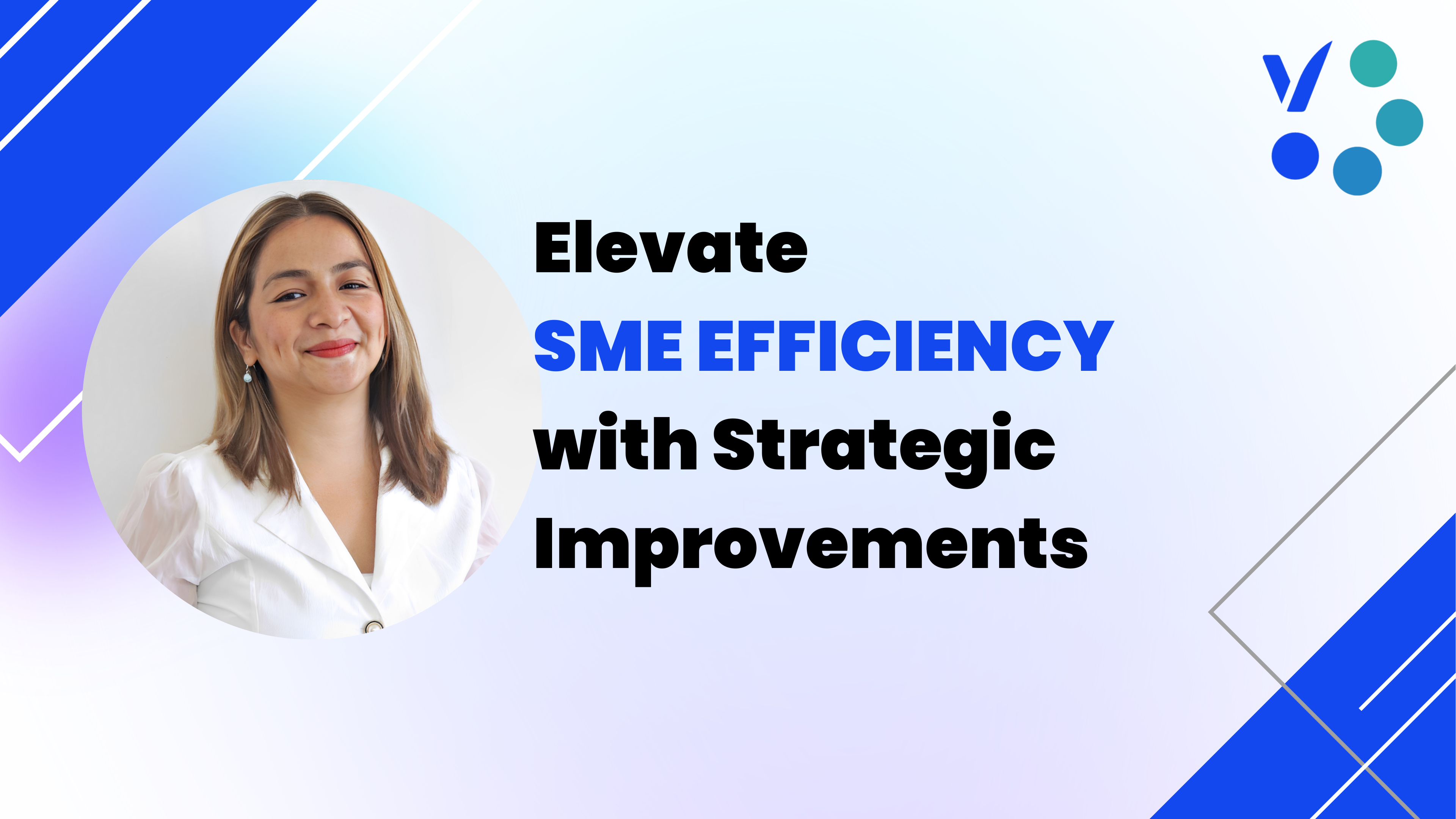Elevate SME EFFICIENCY with Strategic Improvements

By Eloiza Mariano Serate
Small and Medium Enterprises (SMEs) are vital to the global economy, driving innovation and providing substantial employment opportunities. They contribute significantly to the GDP across various countries, underscoring their role as economic powerhouses.
However, SMEs often encounter unique challenges that can impede their growth and operational efficiency. Process improvements can greatly enhance their productivity and scalability. This leads to a pathway to sustained success.
If you’re an SME owner and you’re not leveraging these strategies, you’re definitely missing out! Optimize your business’s potential for growth and efficiency! Read below to learn more.
1. Document Your Processes

Process documentation is a critical step for SMEs aiming to scale and enhance efficiency. It creates a clear blueprint for operations, aids in consistency, and simplifies training and onboarding.
Research indicates that proper documentation and continuous improvement can lead to significant efficiency gains, risk mitigation, and cost reduction (Source: Do You Really Need Process Documentation?)
For instance, a logistics company could document its inventory management process to standardize operations across multiple warehouses. This ensures consistent procedures are followed and reducing errors in inventory handling.
Actionable Tips:
● Use Standardized Templates: Implement templates for process documentation to ensure consistency across the organization.
● Regularly Update Documentation: Keep process documents updated to reflect changes or improvements, ensuring all team members have access to the latest operational procedures.
By adopting these strategic process improvements, SMEs can significantly enhance their operations, positioning themselves for sustainable growth and success.
2. Embrace Digital Transformation

Digital transformation is crucial for SMEs aiming to enhance their competitive edge and operational efficiency. Adopting a digital-first strategy is not just beneficial but essential for survival and growth.
According to Gartner, 87% of senior business leaders say digitalization is a company priority, and 91% of businesses are engaged in some form of digital initiative. (Source: Digital transformation statistics you need to know in 2024)
Consider a retail SME utilizing AI-driven chatbots to handle routine customer inquiries. This technology boosts operational efficiency. These also allows staff to focus on more complex customer service tasks. As a result, the overall service quality and customer satisfaction significantly increases.
As an SME, automating your business processes are the best way towards digital transformation. Consider the technology that you have at your disposal. How can you leverage them so you can propel your business forward? Tips ahead.
Actionable Tips:
● Automate Routine Tasks: Tools like Zapier or Microsoft Power Automate can automate repetitive tasks. Good examples are, automating invoicing, email responses, and social media updates. This frees up valuable time for strategic activities.
● Leverage AI for Insights: Nowadays, you can easily access AI-powered analytics tools like Google Analytics or Tableau. These tools can provide actionable insights from customer data, aiding decision-making and strategy formulation.
3. Apply Lean Management Practices

Lean management focuses on maximizing customer value while minimizing waste, thus doing more with less.
This approach is crucial, as 67% of SMEs struggle to survive due to resource constraints. Lean practices, such as the 5S methodology, can significantly streamline operations and reduce costs. (Source: Small Business, Big Problem: New Report Says 67% of SMEs Worldwide Are Fighting for Survival)
For example, a manufacturing SME could employ Six Sigma techniques to identify and eliminate defects in production processes. This ensures high-quality outputs and increasing customer satisfaction.
Actionable Tips:
● Conduct a Waste Audit: Regularly review operations to identify and eliminate inefficiencies, whether in materials, time, or processes.
● Implement 5S: The 5S methodology enhances workplace efficiency and effectiveness. This is done through five steps: Sort (eliminate the unnecessary). Straighten (organize remaining items), Shine (clean and inspect the area), Standardize (establish procedures), and Sustain (maintain standards consistently).
This structured approach promotes discipline essential for continuous and substantial improvement in productivity.
4. Utilize Agile Project Management

In today’s rapidly changing market environment, agility is key. Agile project management methodologies such as Scrum and Kanban allow SMEs to respond swiftly to market changes and customer feedback. This enhances their capacity to innovate and adapt.
Agile projects are reported to be 28% more successful than traditional projects due to their flexible and iterative nature. (Source: Agile vs Waterfall: Which Method is More Successful?)
For example, a tech startup could use the Scrum framework to manage the development of a new software feature. This method allows for rapid iterations based on user feedback. Adopting these project management strategies can help achieve a better market fit and customer satisfaction.
Actionable Tips:
● Daily Standups: Hold short daily meetings to ensure all team members are aligned with their goals. This can quickly address emerging issues.
● Sprint Planning: Break projects into smaller, manageable tasks and set short-term goals to maintain momentum and adaptability.
5. Strengthen Cybersecurity Measures

SMEs face heightened risks of cyber threats. Enhancing cybersecurity measures is crucial to protect sensitive data and maintain customer trust.
Surprisingly, 43% of cyber attacks target small businesses, yet only 14% are prepared to defend themselves. (Source: Cyber Safety Tips for Small Business Owners)
For example, an e-commerce SME can implement end-to-end encryption for all transactions and two-factor authentication for customer accounts. This can significantly reduce the risk of data breaches.
Actionable Tips:
● Regular Training: Conduct cybersecurity training sessions to educate employees about the latest threats and safe practices.
● Advanced Security Tools: Invest in robust antivirus software, firewalls, and secure backup solutions to safeguard business data.
6. Optimize Customer Relationships

Managing customer relationships effectively is pivotal.
With 74% of businesses affirming that Customer Relationship Management (CRM) software has improved their access to customer data. The strategic implementation of these systems can greatly benefit SMEs. (Source: 20 Impressive CRM Statistics You Need to Know in 2024)
For example, a boutique can use CRM data to send personalized email campaigns. They can offer special discounts on items previously viewed by customers. This enhances conversion rates and customer loyalty.
Actionable Tips:
● Implement CRM Solutions: Utilize CRM platforms like Salesforce or HubSpot to manage customer interactions and automate marketing efforts efficiently.
● Personalized Marketing: Tailor marketing efforts to individual customer preferences using insights from CRM systems, which can enhance engagement and conversion rates.
7. Focus on Quality Management

Quality management is essential for maintaining high customer satisfaction and operational efficiency. Implementing Total Quality Management (TQM) practices helps SMEs consistently meet or exceed customer expectations, enhancing brand reputation and trust.
TQM involves continuous process evaluation and improvement, making it a vital strategy for sustained success. Studies indicate that organizations with effective quality management systems experience an average of 19% increase in efficiency and a 15% increase in customer satisfaction. (Source: The Rise of Revenue Operations – What is RevOps?)
For example, a software development firm could integrate peer review and beta testing within its TQM framework. This ensures each software release is thoroughly vetted and meets customer needs before full deployment.
Actionable Tips:
● Continuous Improvement Processes: Establish a regular schedule for reviewing and improving workflows and outputs to maintain high standards.
● Employee Training and Involvement: Engage all employees in quality improvement initiatives, providing training and encouraging participation in decision-making processes.
For those looking to further optimize their processes, Virtual Champions PH provides specialized documentation services that streamline and standardize operations, ensuring consistent quality and efficiency. This tailored support is invaluable for SMEs navigating the complexities of scaling and adapting to rapidly changing market demands. These efforts collectively enable SMEs to not only compete but lead in their respective industries.
📞 Are you ready to take your business to the next level? Click the link below to book a call with us and discover how our services can help you win your business battles. 🚀
Let’s have a conversation and get the best Virtual Champion for you!
Want to hear the latest news about Virtual Champions PH?
This could be the start of something awesome! Subscribe to our newsletter. Stay updated with exclusive tips, articles, new product tools and notifications, as well as special service offers from VCPH conveniently in your inbox!
